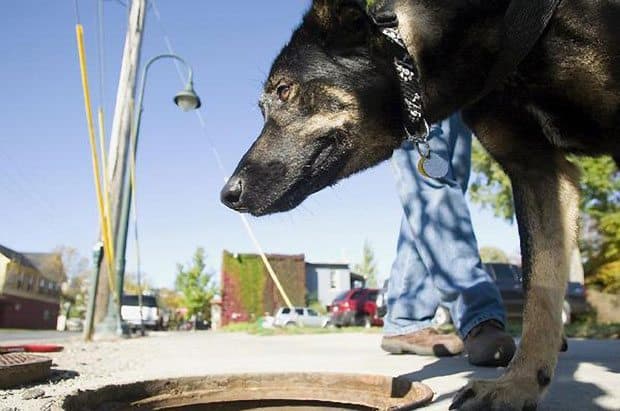
By Sheri McWhirter for record-eagle.com
TRAVERSE CITY, Michigan — Sable, a male German shepherd mix, approached an open manhole with his sensitive nose to the ground, then quickly looked up at his handler and barked.
A positive hit.
Sable and owner Scott Reynolds spent last week in Traverse City to track E. coli contamination sources, part of the Healthy Beaches initiative of the Watershed Center Grand Traverse Bay. The canine team is sniffing out the scent of detergents and human waste in the city’s storm water system that empties into Grand Traverse Bay.
“Usually when you find that in a storm drain it indicates an illicit connection to the storm sewer or a leak in the sanitary sewer system,” said Sarah U’Ren, the Watershed Center’s program director.
Both could lead to elevated E. coli levels at area beaches, especially when the system’s contents are flushed into the bay during heavy rainfalls, she said.
E. coli is a bacteria that indicates human or animal fecal matter contamination.
This week Sable — a shelter rescue dog — detected such contaminates in areas around the intersection of U.S. 31 and Garfield Avenue, as well as some areas along Mitchell Creek near the Traverse City State Park. The dog’s positive hit Friday morning happened at a storm sewer drain at Union and Sixth streets.
City employee Chris Childers accompanied the team and climbed down into the sewer system to take a water sample where Sable reacted.
“We kind of knew a few places where there are problems,” Childers said. “We can now narrow down the areas we need to search.”
The plan is to meet with Traverse City and Grand Traverse County officials when the water sample testing is completed and determine the next steps for pinpointing possible contamination sources, U’Ren said. One possibility is to do a “smoke test,” when the sanitary sewer would be filled with a visible vapor, a way to spot leaks in the system.
Reynolds, training director with Environmental Canine Services in Vermontville, said he doesn’t know of any other canine team doing this type of work. They searched about 70 area manholes last week.
It would have cost about $12,000 to test water samples from that many locations, but the canine team’s efforts cost about $4,000 and were paid for through a grant from the Grand Traverse Band of Ottawa and Chippewa Indians.
Tribal Chairman Derek Bailey said it’s a way to work together to protect the environment..
“It’s important to protect and preserve the natural resources that our ancestors enjoyed and our future generations will come to know and love,” Bailey said.
Area beaches are tested weekly for E. coli contamination throughout the summer and the most-frequent problems are at Bryant Park, the city’s West Bay beach near the entrance to Old Mission Peninsula.
Another $250,000 grant from the U.S. Environmental Protection Agency is expected to install a storm water filtering system at Bryant Park. The sponge-like filter would reduce sediments and bacterial contamination at the storm drain that often “blows its top” during heavy rains and has the most E. coli contamination problems, U’Ren said.
That federal funding is part of the EPA’s Great Lakes Restoration Initiative. The ultimate goal is to remove Bryant Park from the state’s Impaired Waters list, where it’s been included for several years.
